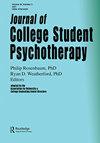就地治疗:严重精神疾病的校园护理模式
IF 1.1
Q3 PSYCHOLOGY, APPLIED
引用次数: 3
摘要
几十年来,大学咨询中心一直在努力满足不断增长的服务需求。研究表明,包括精神药物在内的治疗进步,导致患有严重精神疾病的学生人数增加,他们现在占了这一需求的很大一部分。目前满足治疗需求的策略不足,经常导致患有严重精神疾病的学生退学。这个综合案例研究介绍了罗格斯大学的下一步计划,这是一个专门为在校园里患有严重精神疾病的学生设计的新计划。本案例研究采用社会生态学的方法,追溯了在大学宏观层面、大学咨询中心中观层面以及在“下一步计划”中接受治疗的学生微观层面实施的变革的发展。通过强调校园治疗如何消除常见的治疗障碍,并改善患有严重精神疾病的学生和他们所就读的大学的结果,大学咨询专家和管理人员将了解校园治疗可以提供的关键积极影响。本文章由计算机程序翻译,如有差异,请以英文原文为准。
Treating in Place: A Model of On-campus Care for Serious Mental Illnesses
ABSTRACT For several decades, college counseling centers have struggled to meet a steady rise in demand for services. Research suggests that therapeutic advancements, including psychotropic medication, have led to an increase in students with serious mental illnesses who now represent a significant portion of this demand. Current strategies to meet the demand for treatment have fallen short, often resulting in students with serious mental illnesses withdrawing. This composite case study introduces the Next Step Program at Rutgers University, a new program designed specifically to treat students with serious mental illnesses on campus. Using a social ecological approach, this case study traces the development of changes implemented at the macro level of the university, the meso level of the college counseling center, and the micro level of a student receiving treatment at the Next Step Program. By highlighting how on-campus treatment removes common barriers to care and improves outcomes for both students with serious mental illnesses and the universities they attend, college counseling professionals and administrators will learn of the crucial positive impacts on-campus treatment can provide.
求助全文
通过发布文献求助,成功后即可免费获取论文全文。
去求助
来源期刊

JOURNAL OF COLLEGE STUDENT PSYCHOTHERAPY
PSYCHOLOGY, APPLIED-
CiteScore
3.20
自引率
7.10%
发文量
16
期刊介绍:
The Journal of College Student Psychotherapy® is dedicated to enhancing the lives of college and university students by featuring high-quality articles about practice, theory, and research in mental health and personal development. Contributions to the journal come from professionals in the field of mental health and counseling and from college staff, faculty, and students. The journal is written specifically for college and university administrative staff and faculty as well as counselors and mental health professionals. Regular quarterly issues of the journal feature articles of central interest to psychotherapists and counselors while also expressing broader implications for everyone who wishes to understand students.
 求助内容:
求助内容: 应助结果提醒方式:
应助结果提醒方式:


